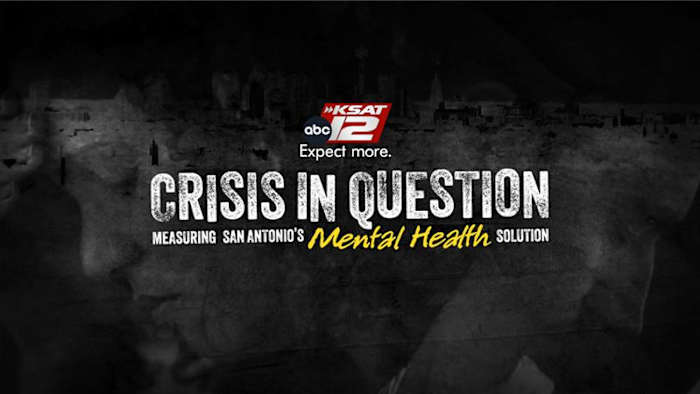Introducing KSAT’s ‘Question Problems: Measuring San Antonio Mental Health Solutions’
SAN ANTONIO – Statistics show one in five adults living in the United States has a mental illness. In San Antonio, the number of one in five would add up to about 250,000 people.
“There is a mental health crisis in America,” San Antonio Mayor Ron Nirenberg said. This has been going on for decades.”
Call records show that people in crisis often turn to 911. In 2023, the San Antonio Police Department received more than 32,000 mental health calls to 911.
There is no one-size-fits-all solution to this problem. The city of San Antonio has put its trust in SA CORE, but is this program effective and efficient?
That’s the question KSAT explores in our “Crisis Question: Measuring San Antonio’s Mental Health Solution.”
What happens during a mental health emergency?
“It’s the worst day you’ve ever had in your life and it’s over a million,” said Samantha, a crisis response doctor for SA CORE. There is a lot of fear and anxiety.
These times of crisis may look different for each person, but common experiences include:
-
Mood swings
-
Flashbacks
-
Accident risk
“You’re hopeless,” Samantha said. “It’s always a series of events.”
Mental health advocates say a crisis can be triggered by a variety of stressful life events. It could be the death of a loved one, a change of residence or a natural disaster.
Ernest Stevens, deputy director of the branch at the National Council’s Justice Center, said connecting someone with the right tools can make all the difference.
“These calls are very fluid, and they can change over time,” Stevens said. “It will never end.”
Stevens said the best response to someone in distress is often:
-
Stay calm
-
Listening to disturbing things
-
To provide support
-
Encourage them to seek professional help
“Safety can no longer be the absence of crime,” Stevens said. “It must be a healthy presence.”
What does a crisis response look like?
Many cities across the US have established crisis response teams to respond directly to 911 mental health calls. Eugene, Oregon has CAHOOTS, Denver has STAR and San Antonio has SA CORE.
“We’re doing everything we can and we’re continuing to learn how we can best solve this problem,” Nirenberg said.
In addition to the crisis response team, when a mental health call comes to 911, the police are tasked with responding.
“We are not experts,” said SAPD Chief William McManus. “The police were not equipped to handle mental health calls.”
That’s why SA CORE was created: to bridge the gap in emergency response.
SA CORE stands for San Antonio Community Outreach and Resiliency Effort. The program was launched in 2022 to reduce health problems and connect people with mental health services.
Currently, the unit responds to approximately 14% of 911 mental health calls in San Antonio each year.
The SA CORE unit consists of three team members: the San Antonio Police Mental Health Unit, a paramedic at the San Antonio Fire Department and the Center for Health Services emergency response nurses.
No one unit across the country looks like another. These programs often take many forms of practice, but the division of labor into groups often varies.
How do we report this story?
In this series, we look at the most common types of these media groups. We will compare success and where room for improvement can be found.
Our report takes us to the City of San Antonio and across Bexar County, but we also took a trip to Denver to see a system that is different from SA CORE but has the same phone rates.
The purpose of our report is to move the conversation forward in crisis response. City leaders, like McManus, said SA CORE was built with longevity in mind.
What is the best way for SA CORE to grow? Is mental health taken seriously in San Antonio? How should tax dollars be used to support people with mental health problems?
We will answer these questions and more as our series continues.
“We want this to be a tool,” Nirenberg said. “We need to use creativity and experience to deal with it.”
“Question Problems: Measuring Mental Health in South Texas” will air Monday, Nov. 11 on The Nightbeat with a new episode every night at 10 p.m., peaking on Friday, Nov. 15 at 10 pm All episodes can be seen on KSAT, KSAT+, KSAT’s YouTube channeland KSAT.com.
If you or someone you know is struggling with mental health or suicidal thoughts, call 988 or text TALK at 741-741.
You can also reach the American Foundation for Suicide Prevention (AFSP) or the National Alliance of Mental Illness (NAMI) at 210-223-7233 (SAFE) or 800-316-9241. You can also text NAMI to 741-741.
Copyright 2024 by KSAT – All rights reserved.
#Introducing #KSATs #Question #Problems #Measuring #San #Antonio #Mental #Health #Solutions
